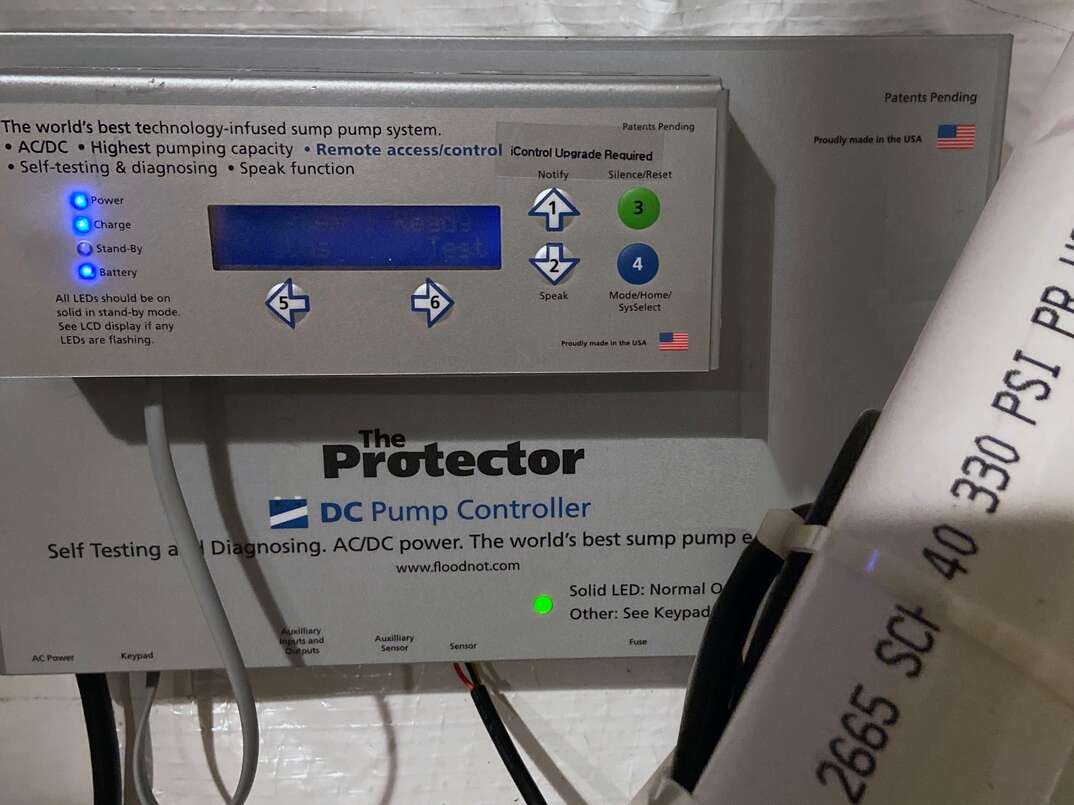- AppliancesElectriciansHVACLandscapingLocksmithPest ControlPlumbingRenovationRoofingT V RepairAll Home Improvement
- Car AccidentClass ActionCorporate LawCriminal DefenseDivorce LawEmployment LawFamily LawFinancial LawLegal AidMedical Injury LawyersMedical MalpracticeReal Estate LawWater Fire RestorationAll Legal
- InvestmentRetirementAll Finance
- Animal InsuranceAutoGeneral InsuranceHealth PolicyHome RentersAll Insurance
- DentalHealth SpecialistsAll Medical
- Animal CareVeterinaryAll Pets
- Auto GlassTowingAll Automotive
Alert: Here's What to Know About Sump Pump Alarms

When the rain starts falling, the last thing you want to hear is your sump pump alarm going off.
While the sound of this alarm doesn’t necessarily mean there’s an emergency, it does mean you need to take action. Quick action now may prevent costly damage later.
A sump pump alarm is an electronic device that monitors the water level in your sump pump’s basin. Most sump pump alarms are powered by electricity. However, if there’s a power outage, the alarm will stop working. It’s recommended to invest in a sump pump alarm that has a battery power backup to avoid this issue.
These alarms are an essential part of your sump pump. They can alert you if the water in your basement or crawl space is rising to higher-than-normal capacity or your sump pump isn’t working properly.
How Does It Work?
There are numerous ways water can enter your basement or crawl space, including plumbing issues, heavy rains or floodwaters. No matter how the water enters your home, a sump pump can keep your basement dry by pumping the water outside.
Under normal circumstances, sump pumps are very efficient at keeping your basement dry. However, if your system is malfunctioning or water is coming in at a faster rate than your sump pump can handle, you could have a problem.
Unfortunately, this water can start causing damage in a relatively short period of time. This is when a sump pump alarm can help. It can alert you to a problem so you have time to take action.
A sump pump alarm works by detecting high water levels in your sump pump basin. Typically, you can attach this alarm to the top of the sump pump, but some types of alarms can be wall-mounted or attached to the discharge pipe. If the water reaches the sensors on the alarm, it will start beeping to alert you that there could be a problem.
Just because your sump pump alarm is going off doesn’t mean your basement is flooding. There are several reasons your sump pump alarm may go off, including:
- Power outage
- Clog in sump pump piping
- Sump pump malfunction
- Water on top of the alarm
- Calling a Plumber? Here Are the 6 Most Common Plumbing Jobs and How Much They Cost
- 6 Ways to Try to Unclog Your Sink Before You Call a Plumber
- What's in My Plumber's Van?
- Here's How Much It Costs to Remodel a Bathroom
- 6 Tips for Hiring a Plumber
Do You Need a Sump Pump Alarm?
According to the Insurance Information Institute, 1 in 60 insured homeowners experience property damage due to water or freezing temperatures every year. Water damage can lead to hundreds or even thousands of dollars in home repairs and cleanup costs. Unfortunately, this damage can occur before you even realize there’s a problem.
Let’s say a storm with heavy rain is passing through your area. You may be so concerned about making sure everyone in the home is okay and the doors and windows are shut that you forget to think about the sump pump in the basement. Without an alarm, the water in your sump pump could exceed capacity before you know it. However, a sump pump alarm can start beeping the minute the water in the basin surpasses a set level, giving you time to take action before extensive water damage occurs.
Whether your pump has lost power, a pipe bursts or your pump can’t keep up with the level of water coming into your home, an alarm can give you time to make the necessary sump pump repairs or call in a professional plumber. While not all sump pumps come with an alarm, it’s a critical feature to have.
How Much Does a Sump Pump Alarm Cost?
Sump pump alarms are fairly inexpensive. According to Fixr, the cost of a sump pump alarm typically runs anywhere from $15 to $30 (CAD 20 to CAD 40). However, depending on the type of sump pump you have and the quality of the alarm you’re looking for, these costs could go as high as $100 (CAD 134). It’s important to shop around and compare your options before making your final purchase.
All CAD conversions are based on the exchange rate on the date of publication.
Elocal Editorial Content is for educational and entertainment purposes only. Editorial Content should not be used as a substitute for advice from a licensed professional in your state reviewing your issue. Systems, equipment, issues and circumstances vary. Follow the manufacturer's safety precautions. The opinions, beliefs and viewpoints expressed by the eLocal Editorial Team and other third-party content providers do not necessarily reflect the opinions, beliefs and viewpoints of eLocal or its affiliate companies. Use of the Blog is subject to the
Website Terms and Conditions.The eLocal Editorial Team operates independently of eLocal USA's marketing and sales decisions.



